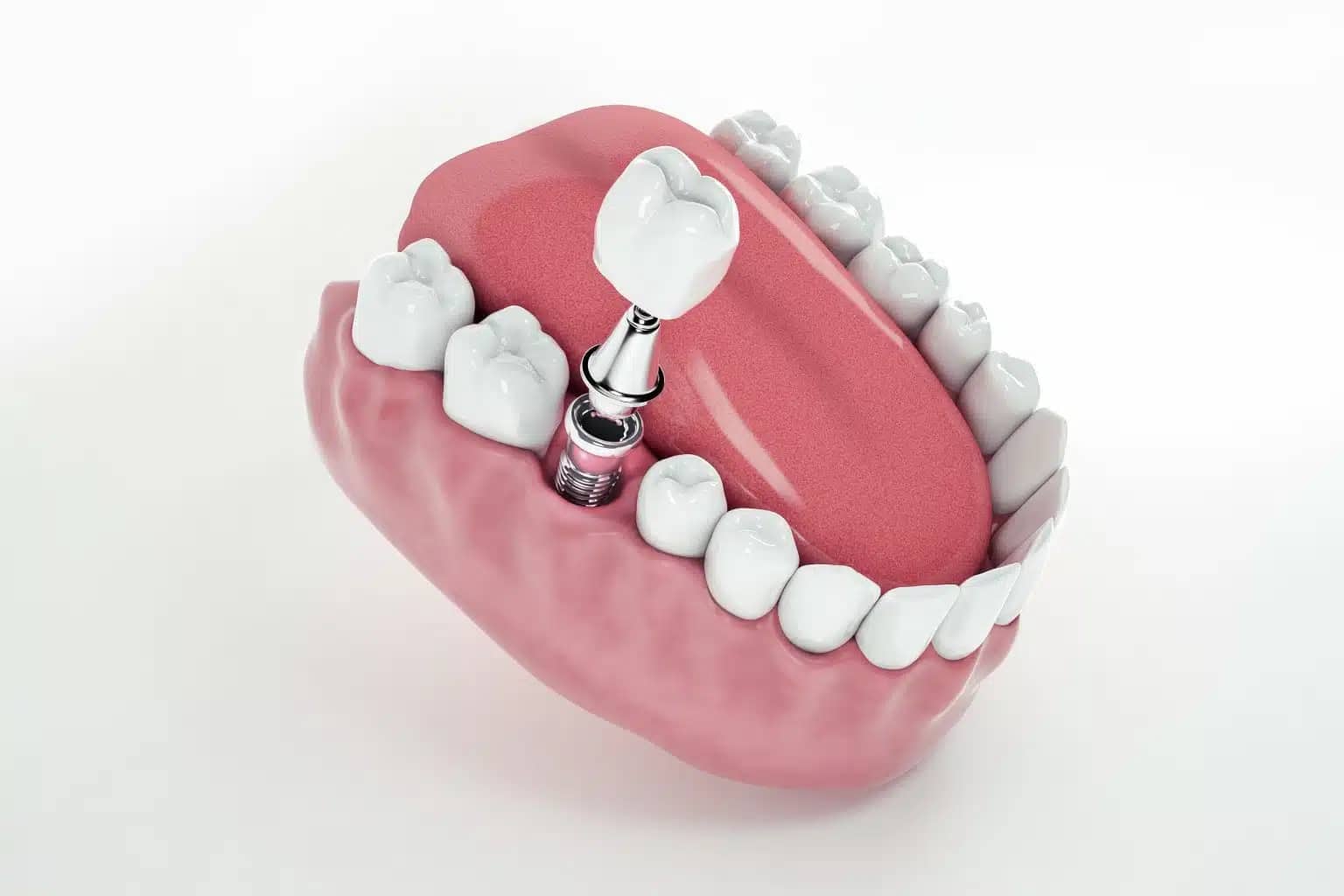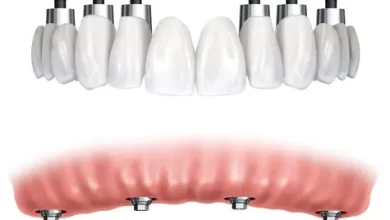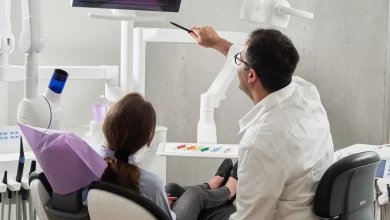How to Care for Dental Implants? : Expert Tips for Lifelong Success.

To care for dental implants, practice good oral hygiene and visit your dentist regularly for check-ups and professional cleanings. Dental implants require proper care to ensure their longevity and functionality.
By following a few simple steps, you can maintain a healthy oral environment and protect your investment. Regular brushing and flossing around the implant area, using non-abrasive products, is essential to remove plaque and food debris. Avoiding hard or sticky foods, and quitting smoking, can also contribute to implant success.
Additionally, scheduling regular appointments with your dentist allows for professional cleanings and examinations, ensuring early detection of any potential issues. With proper care and maintenance, dental implants can provide long-lasting benefits and a confident smile.
The Importance Of Dental Implant Care
Maintaining the longevity of your dental implants is crucial for optimal oral health. Proper care and maintenance ensure the success of the procedure and the prevention of complications. Regular oral hygiene practices are essential to keep your implants healthy and functional.
One important aspect of dental implant care is brushing. Brushing your teeth at least twice a day using a soft-bristled toothbrush and a non-abrasive toothpaste is recommended. This helps remove plaque and bacteria that can accumulate around the implant area. Remember to brush gently to avoid damaging the gum tissue surrounding the implant.
Alongside brushing, flossing is equally important. It helps remove food particles and plaque from the spaces between the teeth and implants. You can use floss specially designed for implants or interdental brushes to effectively clean these areas. Be gentle while flossing so as not to harm the gum tissue.
Regular dental check-ups are crucial to monitor the health of your implants. Your dentist will examine the implant area, assess bone health, and make necessary recommendations. Professional cleanings by a dental hygienist can also help remove any plaque or tartar buildup that might be affecting your implants.
Lastly, it’s important to maintain a healthy lifestyle. Avoid smoking, as it can significantly impact the success of your dental implants. A balanced diet and limiting sugary foods and beverages also contribute to overall oral health and the longevity of your implants.
Daily Oral Hygiene For Dental Implants
When caring for dental implants, daily oral hygiene practices are crucial to maintaining a healthy mouth. Brushing and flossing techniques specifically designed for dental implants should be followed diligently. It is essential to select the right toothbrush and dental floss to ensure effective cleaning without causing any damage to the implants. Soft-bristled toothbrushes and low-abrasive dental floss are generally recommended. Incorporating an antibacterial mouthwash into your routine can also help in preventing oral infections and maintaining oral health. Regular visits to the dentist for professional cleanings and check-ups are equally important. Following these oral hygiene practices will help keep your dental implants clean, reduce the risk of complications, and ensure their long-term success.
Dietary Considerations For Dental Implant Health
Achieving and maintaining healthy dental implants requires a balanced diet that provides the necessary nutrients for healing and implant stability. Include a variety of foods in your diet to ensure you receive a combination of essential vitamins and minerals. Incorporate foods rich in calcium, such as milk, cheese, and yogurt, for strong bones and healthy gum tissues. Crunchy fruits and vegetables like apples and carrots can help keep implants clean by stimulating saliva flow and reducing plaque buildup.
To protect the longevity of your dental implants, it’s important to avoid certain foods and beverages. Avoid hard or sticky candies, which can cause damage or dislodgment of the implant. Limit your intake of sugary and acidic foods and drinks, as they can contribute to gum disease and implant failure. Avoid chewing on ice or popcorn kernels, as they can also put excessive pressure on the implants and increase the risk of complications.
Several nutrients play a crucial role in promoting healing and implant stability. Ensure your diet includes protein-rich foods like lean meats, fish, poultry, and legumes to support tissue repair and wound healing. Vitamin C is essential for collagen formation and can be found in citrus fruits, strawberries, and broccoli. Omega-3 fatty acids, found in fatty fish like salmon, can help reduce inflammation and support implant integration. Lastly, vitamin D aids in calcium absorption and can be obtained through exposure to sunlight or dietary sources such as fortified milk and eggs.

Credit: jaximplant.com
Protecting Dental Implants During Physical Activities
Protecting dental implants during physical activities is crucial to ensure their longevity and functionality. One important measure is choosing the right mouthguard when participating in sports or engaging in vigorous physical activities. The mouthguard acts as a barrier, preventing direct impact on the implants and reducing the risk of damage. It is advisable to consult with your dentist to determine the most suitable mouthguard for your specific needs.
In addition to using a mouthguard, there are other tips to prevent damage to dental implants during contact sports. Maintaining good oral hygiene by regular brushing and flossing is essential to keep the implants and surrounding tissues healthy. It is also important to inform your sports team or coach about your dental implants, so that appropriate precautions can be taken during training or games.
Individuals with dental implants should take additional precautions such as avoiding hard or sticky foods that could potentially cause damage. Regular dental check-ups and professional cleanings will help detect any issues early on and ensure the implants are in good condition.
Regular Dental Check-ups And Maintenance
Dental implants require regular dental check-ups and maintenance to ensure their longevity and functionality. Professional dental cleanings play a crucial role in the care of dental implants. Therefore, it is essential to schedule regular visits to your dentist for routine check-ups and cleanings. These appointments allow the dental professional to assess the condition of your implants, address any issues of gum disease or peri-implantitis, and provide appropriate treatments or preventive measures. Depending on your specific situation, the frequency of these check-ups and cleanings may vary, but typically, it is recommended to visit the dentist every six months for routine maintenance. By maintaining regular dental check-ups and cleanings, you can ensure the health and success of your dental implants for years to come.
Handling Dental Implant Complications And Emergencies
If you experience persistent pain, discomfort, swelling, or bleeding around the area of your dental implant, it may be a sign of complications. Another indication is the loosening or shifting of the implant. Additionally, a sudden change in bite alignment or the appearance of an abscess should not be ignored. Immediate action is crucial to prevent further damage or potential infection.
Steps to take in case of implant dislodgement or fracture:
If your dental implant becomes dislodged or fractures, it is important to contact your dentist as soon as possible. Avoid trying to fix it yourself, as this could lead to further complications. If possible, preserve any broken pieces and bring them to your dentist. They will evaluate the situation and determine the appropriate course of action, which may involve repositioning or replacing the implant.
If you encounter a dental implant emergency outside of regular office hours, it is crucial to seek immediate professional care. Contact your dentist’s emergency line or visit an emergency dental clinic. They will assess the situation and provide the necessary treatment to alleviate pain, prevent infection, and ensure the long-term success of your dental implant.
Lifestyle Habits And Dental Implant Success
Smoking and tobacco use can significantly impact the success of dental implants. Research has shown that smokers are at a higher risk of experiencing implant failure compared to non-smokers. Tobacco use can impair healing and reduce blood flow to the gums, making it harder for implants to properly integrate with the jawbone. It is crucial for individuals considering dental implants to quit smoking or avoid tobacco use to maximize the chances of a successful outcome.
Managing stress is another important factor in ensuring optimal implant health. Studies have suggested a link between stress and periodontal disease, which can negatively affect implant stability. Implementing stress-reducing techniques such as exercise, meditation, or therapy can contribute to overall oral health and increase the longevity of dental implants.
In addition to avoiding harmful habits, establishing good oral hygiene practices is essential. Regular brushing and flossing help to maintain healthy gums and prevent infections that may jeopardize the success of dental implants. Routine dental check-ups and cleanings should not be neglected as well. By staying proactive and taking care of oral health, individuals can enjoy the long-term benefits of their dental implants.
Caring For Dental Implants: Expert Tips For Lifelong Success
Caring for your dental implants is essential to ensure their longevity and success. To that end, we have compiled expert tips to help you maximize the lifespan of your implants and avoid common mistakes that can compromise their health.
Common mistakes to avoid in dental implant care:
- Using abrasive toothpaste or harsh dental tools that can scratch the implant surface.
- Neglecting proper oral hygiene, such as regular brushing, flossing, and rinsing with an antibacterial mouthwash.
- Skipping regular dental check-ups and professional cleanings.
- Chewing on hard or sticky foods that can exert excessive pressure on the implants.
- Smoking or using tobacco products, which can hinder the healing process and increase the risk of implant failure.
Advice for maximizing the lifespan of your dental implants:
- Follow a consistent oral hygiene routine, including brushing your teeth at least twice a day for two minutes and daily flossing.
- Use a soft-bristled toothbrush and non-abrasive toothpaste to clean your implants gently.
- Visit your dentist regularly for check-ups, cleanings, and professional maintenance of your dental implants.
- Avoid chewing on hard objects or ice that can cause damage to your implants.
- Avoid smoking or using tobacco products to promote better healing and overall oral health.
Frequently Asked Questions Of How To Care For Dental Implants?
How Do You Take Care Of A Dental Implant?
To take care of a dental implant, follow these steps: 1. Brush twice a day, using a soft-bristle toothbrush and non-abrasive toothpaste. 2. Floss daily, gently guiding the floss around the implant area. 3. Avoid biting hard foods or using the implant to open packages.
4. Visit your dentist regularly for check-ups and professional cleanings. 5. Report any concerns or issues to your dentist immediately.
What Not To Do When You Have Implants?
Avoid biting or chewing on hard objects, such as ice or pen caps. Refrain from smoking or using tobacco products, as they can cause gum disease. Do not neglect regular oral hygiene practices, such as brushing and flossing. Avoid consuming sticky or hard foods that may damage your implants.
Finally, do not skip your scheduled dental check-ups and cleanings.
How Do You Keep Dental Implants Healthy?
To keep dental implants healthy, follow these guidelines: 1. Brush and floss regularly to remove plaque buildup. 2. Visit your dentist for routine check-ups and cleanings. 3. Avoid smoking and limit alcohol consumption. 4. Maintain a balanced diet and stay hydrated.
5. Protect your implants by wearing a mouthguard during physical activities.
What Is The Best Way To Clean Dental Implants?
The best way to clean dental implants is by brushing them thoroughly using a soft-bristle toothbrush and non-abrasive toothpaste. Additionally, flossing around the implants and using an antimicrobial mouthwash can help maintain their cleanliness. Regular dental check-ups are also crucial for professional cleaning and maintenance.
Conclusion
Taking care of your dental implants is essential to maintain a healthy and beautiful smile. Following a proper oral hygiene routine, which includes brushing, flossing, and rinsing, is vital. Regular visits to your dentist for check-ups and professional cleanings are also crucial.
By adhering to these guidelines, you can ensure the longevity of your dental implants and enjoy the benefits of a confident and functional set of teeth. Remember, a little effort goes a long way in preserving your dental implants and overall oral health.




